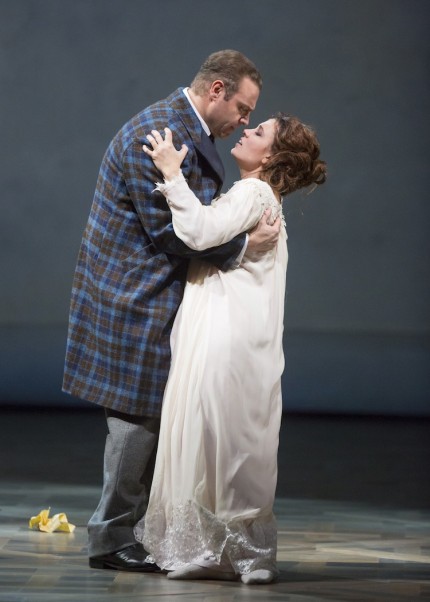Soprano’s Lyric Opera debut sparks a well sung and impassioned “Traviata”

The Lyric Opera of Chicago began life in 1954 and Verdi’s La Traviata has been a regular part of the company’s repertory since Maria Callas starred in that season’s production.
There have been Violettas, great and less so, over the ensuing decades with some of Chicago’s celebrated exponents of the role of the Parisian courtesan, including Eleanor Steber, Montserrat Caballe, Ileana Cotrubas, June Anderson, and, most recently, Renee Fleming in 2008.
Wednesday night it was the turn of Marina Rebeka, a relatively little known singer stateside, who was making her company debut. And while the Latvian soprano seemed to take a while to find her vocal footing opening night, with a boost by the terrific Joseph Calleja as Alfredo, the two principals sparked a vibrant and impassioned performance in what is Lyric’s most vocally successful show so far this season.
Rebeka is a gifted singer and makes an attractive presence onstage but she seemed ill at ease and nervous in the opening minutes Wednesday night with her words almost indecipherable in the Brindisi. Rebeka’s phrasing was choppy in Un di felice and she sang Ah fors’e lui with pure tone yet tip-toed dexterously through the final bursts of coloratura.
Whether a directorial decision or the singer’s own idea, singing Sempre libera as a tortuous confession rather than the joyous declaration of free living Verdi intended didn’t work dramatically at all. Though Rebeka began to show us what the advance notices are about, singing with creamy tone and impact, albeit eschewing the optional E flat.
The soprano seemed a different person after the first intermission, acting with greater subtlety and singing with consistent lovely gleaming tone and touching expression in Dite all giovine. From there she rose from strength to strength, affecting as the unjustly accused victim of Alfredo’s wrath, and bringing a tragic dignity to the final scene with a rendering of Addio del passato that was beautifully sung, pure-toned and heart-rending.
If Rebeka was slow off the mark opening night as Violetta, Joseph Calleja was a first-class Alfredo in every way. Building on his strong showing in last season’s La Boheme, the Maltese tenor sang with ardent tone, Italianate squillo and clarion top notes.
His Brindisi was light and nimble, with his quick vibrato lending excitement. Calleja was aptly impassioned in the dramatic moments yet wonderfully nuanced in his vocalism, with artful dynamic shading and floating a honeyed legato in Un di felice and Parigi, o cara.
Calleja is also a fine actor and consistently credible and alive to the dramatic situation. He conveyed Alfredo’s joy in meeting Violetta in Act 1, anguish at losing Violetta and fury at her perceived betrayal, violently flinging his money at her. Let’s hope that this immensely gifted artist continues to be an annual visitor to Chicago.
Quinn Kelsey’s robust baritone isn’t the most Italianate in timbre yet the young American singer and former Ryan Center member, made a worthy enough Germont, contributing a graceful Di Provenza. Dramatically he etched a solid portrait of Alfredo’s bourgeois father though Kelsey’s acting seemed far too gruff and angry toward his son in the final scene.
Lyric has said this is the first complete Traviata the company has ever done (optional high notes apart). While hearing the second verses of Ah, fors’e lui and Addio del passato paid dividends, Germont’s Act II cabaletta, No, non udrai rimproveri feels a textual bridge too far, making the scene go on longer than is ideal.
This second Lyric Opera production marking Giuseppe Verdi’s centennial season year is a new staging—largely traditional, with a few oddities, but nothing that gets in the way of the fine singing or the unfolding tale of Verdi’s tragic romance.
Riccardo Hernandez’s effective sets offered a stark minimalism with the curved stone back wall and nearly empty stage, an aptly chilly visual for the impoverished dying Violetta. The red tapestry for Flora’s party provided the right contrast.
Cait O’Connor’s costuming proved more of a mixed bag. The 18th-century clothes and wigs with goth touches for the opening party scene set the eclectic, at times inchoate style. The huge puppets of a bull’s skeleton were fun in the Act 2 Spanish ballet. Less so were the gender-bending lead dancers that took the scene decisively out of period along with the ghoulish makeup for the chorus and dancers that seemed riffed from Heath Ledger’s Joker makeup in The Dark Knight and Lon Chaney in the 1925 Phantom of the Opera.
The one fatal conceit was the diaphanous wings on the back of Violetta’s elegant white gown in Act 1. In addition to looking ridiculous, the wings got slightly twisted, which provided an unwonted visual distraction in the scene’s dramatic moments.
Likewise, the stage direction by Arin Arbus was mostly unobtrusive with a few jarring missteps. Most grievous was having Germont violently slap Alfredo in Act 2 (memo to directors: upper-class 19th-century Europeans don’t act like two-fisted characters in American action movies). Some of the blocking was stilted, especially that of the chorus in the party scenes. The opera’s crucial final moments were awkwardly staged as well and felt like a work in progress.
Ryan Opera Center member Richard Ollarsaba was a notably rich-voiced Dr. Grenvil. The remaining comprimario roles were adequately taken by other Ryan young artists including J’nai Bridges as Flora, Will Liverman as the Marquis and Julie Anne Miller as Annina. Under Michael Black’s direction, the Lyric Opera Chorus provided their usual excellence.
Massimo Zanetti possesses impressive maestro hair but proved something of a routinier in the pit. The Italian conductor kept the music moving capably but offered little delicacy or expressive detailing. The glowing preludes to the outer acts hovered at a steady mezzo-forte and Zanetti often emphasized secondary wind lines to no discernible benefit.
La Traviata runs through December 20. lyricopera.org; 312-332-2244.
Posted in Performances




